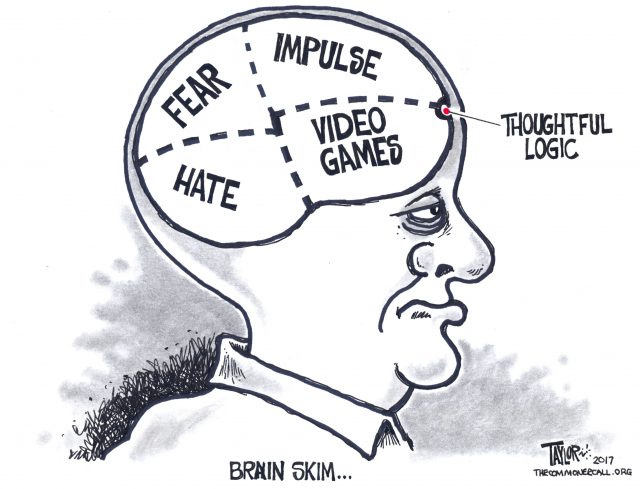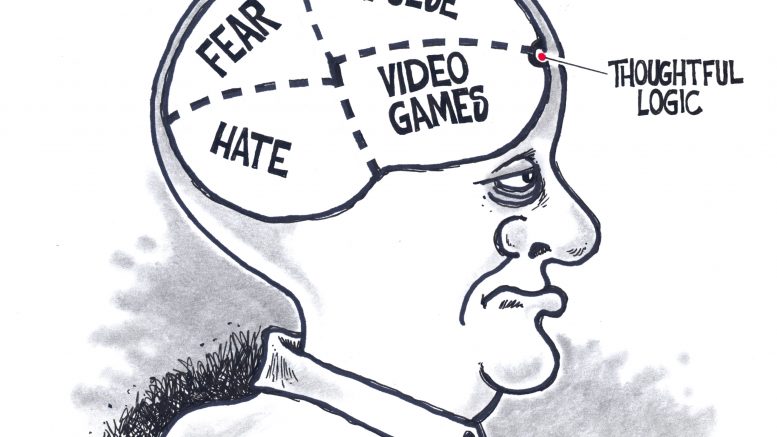
By Robert Jervis
The Converstaion (5/16/17)
Why has President Trump failed to convince anyone other than his ardent supporters that he was justified in firing FBI Director James Comey? Even more, why did he fail to realize that the firing would call up strong objections, not only from Democrats, but from many Republicans?
The psychology of perception and decision-making helps us here. As I have shown in several books, assuming people are completely rational will mislead us. We need to grasp what people see – and what they miss – if we are to fathom why they behave as they do.
Not facing painful trade-offs
The obvious explanation for Trump’s failure is what many observers see as his narcissism and consequent inability to understand how others might mistrust him. But he also displays a keen sense of his adversaries. His close advisers like Attorney General Jeff Sessions and Vice President Mike Pence, who have different personality types, seem to have similarly failed to anticipate the outcry.
Instead, my research shows that much of the explanation lies in a common psychological difficulty in facing painful trade-offs and realizing the costs of our preferred course of action. In a form of wishful thinking, when people come to believe that doing something is necessary, they have trouble seeing the obstacles and costs.
As he said himself, Trump felt it was necessary to remove Comey. This belief closed him off from a more accurate perception of the political environment. His failure was facilitated by his knowledge that the Democrats had excoriated Comey for what they saw as his unfair treatment of Hillary Clinton during the campaign. From this he jumped to the conclusion that they would applaud the removal of Comey without taking account of the fact that the context was now very different.
It is all too easy for us to overlook inconvenient questions and to see only what we need and expect.
Trump, like many people, neglected the crucial fact that perception is strongly guided by the framework that observers bring to an event, which is why people so often are surprised when others interpret their behavior in different ways than they intended.
In fact, our minds work like a computer’s autocomplete. They quickly fill in what they are predisposed to expect. Those predisposed to be suspicious of Trump will naturally see the firing as a power grab. Trump’s supporters will not only accept his explanation at face value, but will be stunned that the opponents can be so blind. Psychology as well as politics helps explain why the firing will then make the county even more polarized.
Trump, who prides himself on being decisive, probably shares the commonsense sentiment that actions speak louder than words. In fact, the reverse is often true. People try to make sense of what others are doing, and even decisive actions rarely speak for themselves. That is why political leaders – and most of us in our everyday lives – usually explain not only what we have done, but why we have done it. We give reasons and provide an interpretive framework within which our behavior is intelligible and, we hope, appropriate.
People sometimes think that they control the meaning of their behavior. But they don’t; those who are perceiving and interacting with them do because it is the latter who respond. Of course Trump can fire Comey by simply writing a letter, but the political impact of this move rests with how others see it, which is something the president can influence, but cannot control.
Trump’s errors
Trump made two major errors.
First, as people search for explanation and meaning, they look for consistency.
In explaining why he fired Comey, Trump had an uphill battle because many people already viewed him as vindictive and unable to understand the checks and balances crucial to the American system. He compounded this problem by providing different explanations for the firing. White House Press Secretary Sean Spicer first told us that the reason was Deputy Attorney General Rod Rosenstein’s letter criticizing Comey for his behavior toward Hillary Clinton during the campaign, but Trump subsequently admitted that the decision was made before then, pointing to Comey’s supposed lack of support within the FBI, and then shifting to the argument that he was incompetent and a “showboat.” Leaving aside the plausibility of these arguments – which of course would be judged differently by people with different views of Trump and of Comey – the inconsistencies made it hard for those who were open to persuasion to develop a stable and convincing understanding of his reasons.
The second wound was even more directly self-inflicted. His brief letter to Comey said, “While I greatly appreciate you informing me, on three separate occasions, that I am not under investigation, I nevertheless concur with the judgment of the Department of Justice that you are not able to effectively lead the Bureau.” According to Stephen Hiltner of The New York Times, this was so striking that the editors decided to print the letter right under the headline the next day.
For critics, this was the smoking gun since they were predisposed to believe that Trump had fired Comey because he was too zealous in investigating connections between the Russian hacking and the Trump campaign. Trump presumably meant this sentence to dispel this interpretation, but he neglected the elemental psychological point that his denial just called attention to it.
Is this another Watergate, and this firing like Nixon’s dismissal of Archibald Cox as the special prosecutor when he demanded that the president turn over the White House tapes? Probably not, but my work shows that our understanding of events is strongly shaped by the historical analogies that immediately come to mind. Although Trump is in many ways different from Nixon, it was almost inevitable that the sense that this was Nixonian would precede rather than follow analysis in the minds of most of his critics. A few days later Trump reinforced this impression, presumably inadvertently, by saying that Comey should hope that his conversations with Trump had not been taped.
The media also saw the firing through their ideological lenses. Not only was the coverage provided by MSNBC and Fox News markedly different, but more subtly, The New York Times’ headline was: “Trump Fires Comey amid Russia Inquiry,” while the Wall Street Journal said “Trump Fires James Comey as FBI Chief.”
Liberals like me pride ourselves on being more sophisticated and on using what Nobel Prize winner Daniel Kahneman called System 2, which is slow and careful thinking. But how many of them us have paused in our denunciations of Trump and calls for an unimpeded investigation into the Russian connections to ask whether such a strong instrument of state power as the FBI should be free to act without the supervision of elected officials? Do we really think that a return to the J. Edgar Hoover era is healthy for democracy? It is all too easy for us to overlook inconvenient questions and to see only what we need and expect.
(Republish articles from The Conversation for free, online or in print, under Creative Commons license.)
*****
Why White House Leakers Leak
By
The Conversation (5/16/17)
According to the Washington Post, President Donald Trump revealed highly classified information to the Russian Foreign Minister Sergey Lavrov and members of his delegation during a May 10 meeting in the Oval Office.
In a May 15 story, the Post reported that White House staffers tried to contain the damage by striking Trump’s allegedly inappropriate comments from internal memos.
So how did the Washington Post get the story?
The newspaper story cites “current and former U.S. officials” as sources. Later, the reporters offer more detail, describing one source as “a former senior U.S. counterterrorism official who also worked closely with members of the Trump national security team.”
Translation: The public learned of Trump’s apparent overstep because more than one member of the U.S. intelligence community was willing to leak the information.
As a professor and director of the Applied Intelligence master’s program at Georgetown University, I study, teach and write about homeland security and law enforcement intelligence. I’m curious about why intelligence officers disclose classified information and how that affects their work.
Why whispers start
Leakers and whistleblowers often are motivated by a lack of trust in their chain of command. They denounce wrongdoing and express their dissent through leaking information to the media or advocacy groups. In my view, one example of wrongdoing that is particularly salient today is political interference in intelligence activities.
Trust is undermined when the gathering or sharing of intelligence influences politics or is influenced by politics.
Bottom-up politicization happens when members of the intelligence agencies themselves target individuals or issues for political reasons. For instance, intelligence agencies may go after political opponents to maintain or increase the level of influence they enjoy with the government.
J. Edgar Hoover was renowned for using the resources of the FBI to interfere in politics and keep his job as the head of the FBI for 48 years.
Top-down politicization happens when policymakers – all the way up to the president – spin intelligence and investigations to support their political agenda. A famous case study is the 2002 national intelligence estimate on weapons of mass destruction in Iraq. Then-Vice President Dick Cheney reportedly pressured CIA analysts to quickly produce a report confirming the existence of WMD. Although the evidence was rather tepid, Cheney and George W. Bush used that intelligence to justify the U.S. invasion of Iraq.
Another famous example of top-down politicization comes from President Richard Nixon, who obstructed the special investigation in the Watergate scandal.
Plenty of bad blood
How does this relate to Trump’s most recent meeting with Lavrov?
This latest political drama happened in the midst of a high-profile investigation regarding possible collusion between the Trump campaign staff and the Russian government. And it comes just a week after the dismissal of FBI Director James Comey escalated the tension between the White House and intelligence agencies.
The firing of Comey rattled the FBI, spurring some agency employees to express anonymously their intention to wage a “concerted effort to respond over time in kind.”
But the bad blood goes back even further. In February, Trump accused the FBI of leaking information about the Russian investigation. And, in March, the president expressed his belief that Trump Tower was wiretapped by former President Obama with the help of the Department of Justice.
Hostility between Trump and the intelligence agencies has been heightened by a series of decisions by the White House.
First, on Jan. 31, 2017, Trump fired Sally Yates, acting attorney general, after she informed the White House several times that then National Security Advisor Michael Flynn had lied about his contacts with Russians.
Then, Attorney General Jeff Sessions recused himself from any investigation related to the Russia meddling with the 2016 presidential elections because he omitted to disclose two meetings with the Russian ambassador.
In addition, Rep. Devin Nunes, the chairman of the House Intelligence Committee, had to recuse himself from the investigation on Russian interference in the 2016 election because he was being investigated by the House Committee on Ethics for making unauthorized disclosures of classified information.
Finally, Comey was dismissed a few days after he requested more resources to accelerate the probe on Russia’s interference in the election.
These events undermine the perception of integrity of the investigative process – not just by the general public, but by intelligence officers and investigators. In this environment, it should be expected that more classified information will be disclosed and whistleblowers will come forward. And, there’s a real possibility of an intensified political tug of war in which leakers and whistleblowers deliberately undermine the White House while President Trump tries to do the same to the Russian investigation. …
(Republish articles from The Conversation for free, online or in print, under Creative Commons license.)

